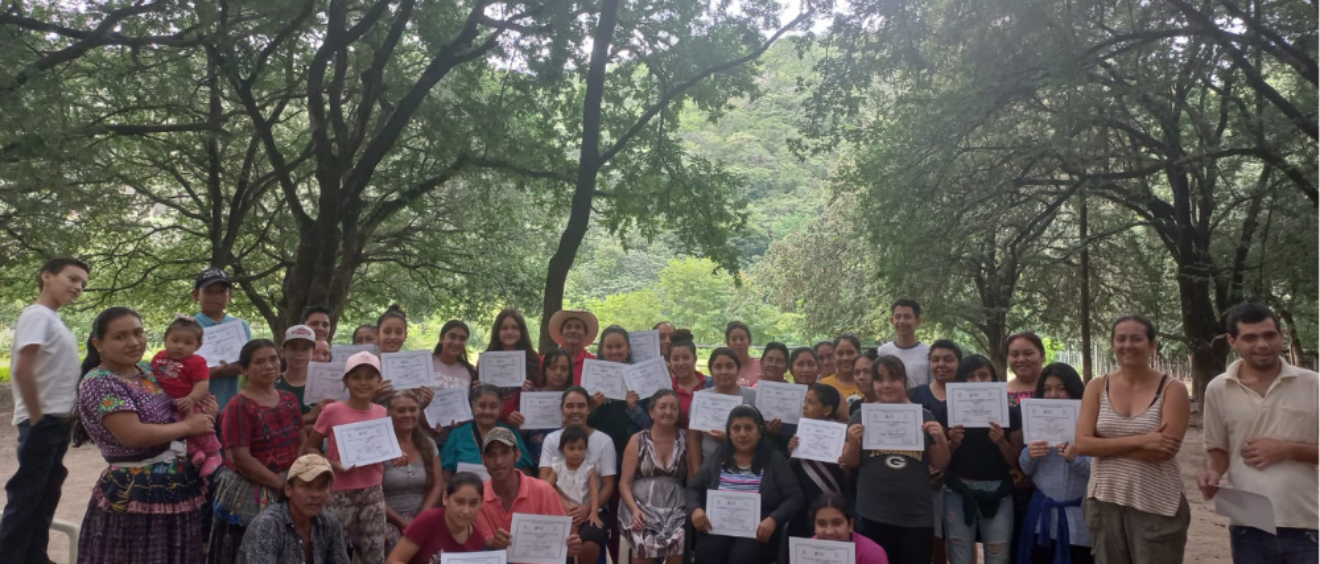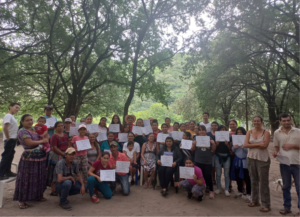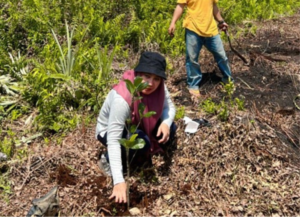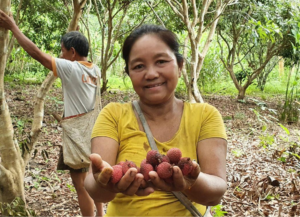
Growing a global network of Analog Forestry promoters
Around the world, the loss and degradation of ecosystems is happening at a dangerous pace. About a quarter of land on Earth has been degraded, meaning that diverse ecosystems that were once rich with life have lost their capacity to thrive and grow. Each year, tens of millions of hectares of forest are destroyed or lose their ability to naturally regenerate. Alongside of their cultural and spiritual importance, healthy forests are a vital source of food, water, and medicine for people worldwide. They provide valuable materials for housing, furniture, crafts, and energy. And they provide essential protection against climate change and its impacts.
As part of the Global Alliance for Green and Gender Action (GAGGA), the International Analog Forestry Network (IAFN), a long-term partner of Both ENDS, is inspiring and supporting women’s leadership in their communities to restore local ecosystems using natural forests as a model. Analog Forestry, the creation of forest gardens that are analogous in structure and function to original forests, enables communities to strengthen their livelihoods and incomes while creating stable and ecologically rich forest landscapes. Analog Forestry is one of the many transformative practices that Both ENDS and our partners strive to bring attention to, scale up, and spread far and wide.
New ways of working
In the last several years, IAFN set a goal for itself to expand and strengthen its network of local practitioners of Analog Forestry, known as ‘Promoters’, with a specific focus on women. Due to the Covid pandemic, however, the network had to profoundly adjust its usual ways of working. Travel restrictions necessitated a shift to online training. On-going technical support for implementation of Analog Forestry sites had to be provided remotely.
IAFN successfully navigated the transition. Since 2020, the Promoters Network has continued to flourish. So too has awareness of the need to invest in and strengthen food sovereignty and agroecological food systems. Trainers and Promoters maintained regular contact with each other via whatsapp groups where they exchanged information and experiences about the implementation of Analog Forestry, such as setting up nurseries, collecting seeds, identifying plants that grow well and those that don’t, dealing with problems with weeds, and applying organic fertilizers.
At the beginning of 2022, with the pandemic still limiting mobility, IAFN and its Cameroon member, CENDEP, organised trainings, thematic mini-workshops and interactive sessions for promoters in Latin America, Asia and Africa. Topics covered, such as biological control, nurseries, soil improvement and the issue of gender justice, were selected by the Promoters themselves. During the mini-workshops, presentations about implementation and commercialisation of products from mature Analog Forests in Ecuador and Sri Lanka served as inspiration for new Women Promoters, helping them envision what can be achieved in the longer-term on their own Analog Forest plots. IAFN plans to follow up on this by including visual materials and virtual ‘walks’ through mature Analog Forests in future online events.
Consolidating progress
As 2022 progressed and travel finally became possible, IAFN took action to consolidate the progress made over the previous two years. With support from Both ENDS, IAFN and CENDEP trainers organised their first post-pandemic on-site visits and monitoring missions to partner organisations and Analog Forestry sites in India, Indonesia, Nepal, Guatemala, Nicaragua, Uganda and Zimbabwe. During the visits, a variety of workshops and learning sessions were held. In Asia, IAFN brought together a new group of Analog Forestry Promoters – seven women and two men from India, Nepal and Indonesia who met in person for the first time in the Asian Promoters Gathering.
In total, 30 Analog Forestry Promoters were strengthened in 2022 in their capacities to restore degraded lands and apply Analog Forestry on the ground. In evaluations of these efforts, IAFN’s Promoters confirm how much they value being part of IAFN’s international network of practitioners and the opportunity to exchange experiences, knowledge and mutual support with others in the network.
Spreading the word, building support
Promoters are spreading their knowledge and enthusiasm for Analog Forestry in their communities. To foster their work, at the end of the year IAFN provided seed grants to Promoters to develop new and existing Analog Forestry demonstration plots. The network is also working to make the work of Promoters more visible. In October, in the lead up to International Day of Rural Women, World Food Day, and the Global Day of Action for Food Sovereignty, IAFN shared the stories of four women Promoters from Nepal, Indonesia, and Bolivia. The articles highlighted the women’s efforts, through agroecology and Analog Forestry, to build community resilience to crises, fight for and ensure food sovereignty, and contribute to regeneration of their territories.
Likewise, Both ENDS is showcasing the transformative promise of Analog Forestry among its key audiences, including donors. As part of the GAGGA Alliance, Both ENDS and its partners are making the case for more recognition, political support, and funding for women-led Analog Forestry and other gender-just climate solutions. At a side event at the 2022 UN climate conference in Egypt, with representatives from governments, the Green Climate Fund, and the Adaptation Fund in the audience, GAGGA partners underscored the need to support local women and indigenous organisations in leading climate action.
In anticipation of the conference, Both ENDS published briefing papers describing two examples of gender-just climate solutions, including a successful women-led Analog Forestry initiative in Cameroon supported by IAFN member CENDEP and a sustainable forest management initiative in India involving ‘Women Barefoot Ecologists,’ a project of Both ENDS’s long-term partner, Keystone Foundation. At the UN conference, the latter received a huge boost when it won the Women and Gender Constituency’s Gender Just Climate Solution Award. The project was specifically recognised for its transformational power.

Women at analog forestry training in Guatemala. Photo by Colectivo Madreselva

Laili Kairnur, one of the Analog Forestry promoters from Indonesia. Photo by Laili Khairnur

Woman showing lychees grown in a food forest in Laos. Photo by Dorn Bouttasing
